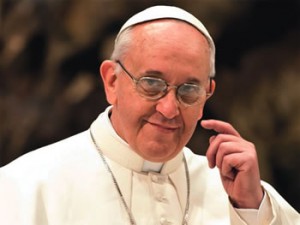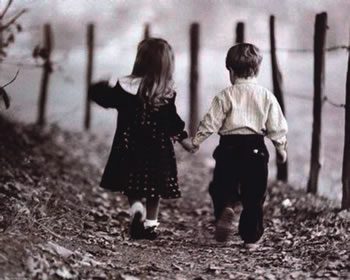On the Family
 Catechesis on the family
Catechesis on the family
Vatican City, 8 April 2015 (VIS) – During today’s Wednesday general audience in St. Peter’s Square, the Holy Father continued with his cycle of catechesis on the family, completing his reflection on children, “the most beautiful fruit of the blessing that the Creator has bestowed on man and woman.” This week he focused on the “stories of passion” that many children sadly experience. “Many children, from the very beginning, are rejected, abandoned, robbed of their childhood and their future. One might even dare say, almost as a justification, that it was a mistake to bring them into the world. This is shameful! Please, let us not punish them for our own errors! Children are never a mistake!”
“Those who have the task of governing and educating – indeed, I would say, all adults – are responsible for children, and everyone must do what he can to change this situation. I refer to the passion of children. Every marginalised, abandoned child, living on the streets by begging or by any other expedient, without schooling, without medical care, is a cry lifted up to God and an accusation against the system we have constructed. … However, none of these children are forgotten by the Father in Heaven. None of their tears are in vain. And our responsibility must not be forgotten either, the social responsibility of persons and countries.”
Francis recalled how Jesus urged the apostles to let the children come to Him, and remarked that “thanks to God, children with serious difficulties very often find extraordinary parents, willing to make any sacrifice and to spare no act of generosity.” However, he added, “these parents should not be left alone! We must accompany them in their efforts, but also offer them moments of shared joy and carefree pleasure, so that they are not entirely consumed by the routines of therapy.” The Pope also mentioned that often children suffer the consequences of lives damaged by precarious or underpaid employment, unreasonable working hours, immature relationships and irresponsible separations. “Often they experience violence that they are not able to overcome, and before the eyes of adults are forced to grow accustomed to degradation.”
The Holy Father emphasised that the well-being of children must always be taken seriously, and noted that now, as in the past, the Church offers her maternity in the service of children and families. “Imagine a society that decided, once and for all, to establish the principle that … where the children who come into this world are concerned, no sacrifice on the part of adults may be judged as too costly or too great, so as to avoid any child believing himself to be a mistake, without value, or being abandoned to the wounds inflicted by life.” He concluded, “May the Lord judge our life by listening to what the angels of children bring to Him, those angels that always see the face of the Father in heaven. Let us always ask ourselves, what do they tell God about.”
The Face of Mercy
 In a formal act, Pope Francis has called on the Church to refashion itself as a place, not of judgment or condemnation, but of pardon and merciful love.The Pope did this in an official Bull of Indiction convoking the extraordinary jubilee Year of Mercy, which will run from December 8, 2015, to November 20, 2016.
In a formal act, Pope Francis has called on the Church to refashion itself as a place, not of judgment or condemnation, but of pardon and merciful love.The Pope did this in an official Bull of Indiction convoking the extraordinary jubilee Year of Mercy, which will run from December 8, 2015, to November 20, 2016.
The 9500 word document, “Misericordiae Vultus” (“The Face of Mercy”), was released on Saturday. It opens with the declaration, “Jesus is the face of the Father’s mercy. These words might well sum up the mystery of the Christian faith.”
The document develops three main themes.
First, Pope Francis dwelt on the theological understanding of God’s mercy.
Secondly, the Pope offered practical ways to live well the Holy Year.
Thirdly, he issued particular calls for justice and conversion.
“Mercy is the very foundation of the Church’s life,” Francis wrote.
“The Church’s very credibility is seen in how she shows merciful and compassionate love.”
The motto of the Holy Year is “Merciful like the Father,” a phrase taken from Luke’s Gospel.The pontiff identified mercy as the central function of the Church and the key aspect of Jesus’ ministry and work.He added that our own exercise of pardon will determine how we will eventually be judged.Francis wrote that mercy and justice are not in contradiction.
The complementarity between man and woman
Vatican City, 15 April 2015 (VIS) – Pope Francis continued his catechesis on the family by dedicating this morning’s general audience to the difference and complementarity between man and woman, recalling first of all that the Book of Genesis insists that both are the image and semblance of God. “Not only man as such, not only woman as such, but rather man and woman, as a couple, are the image of God. The difference between them is not a question of contrast or subordination, but instead of communion and generation, always in the image and semblance of God.”
“Experience teaches us that for the human being to know him- or herself well and to grow harmoniously, there is a need for reciprocity between man and woman,” said the Pope to the thirty thousand faithful present in St. Peter’s Square. “When this does not happen, we see the consequences. We are made to listen to each other and to help each other. We can say that, without mutual enrichment in this relationship – in terms of thought and action, in personal relationships and in work, and also in faith – the two cannot even fully understand what it means to be a man and a woman.”
“Modern and contemporary culture has opened up new spaces, new freedoms and new depths for the enrichment and understanding of this difference. But it has also introduced many doubts and much scepticism. I wonder, for example, if so-called gender theory is not an expression of frustration and resignation, that aims to cancel out sexual difference as it is no longer able to face it. Yes, we run the risk of taking a step backwards. Indeed, the removal of difference is the problem, not the solution. To solve their problems in relating to each other, men and women must instead speak more, listen more, know each other better, value each other more. They must treat each other with respect and cooperate in friendship. With these human bases, supported by God’s grace, it is possible to plan a lifelong matrimonial and family union. The marriage and family bond is a serious matter for all, not only for believers. I would like to encourage intellectuals not to ignore this theme, as if it were secondary to our efforts to promote a freer and more just society.”
“God has entrusted the earth to the alliance between man and woman; its failure makes our emotional life arid and obscures the heaven of hope. The signs are already worrying, and we can see them. I would like to indicate due points, among many, that I believe must concern us with greater urgency.”
“Undoubtedly we must do far more in favour of women, if we want to strengthen the reciprocity between men and women. Indeed, it is necessary for a woman not only to be listened to, but also for her voice to carry real weight, recognised authority, in society and in the Church. The way in which Jesus Himself regarded women, in a context that was far less favourable than our own, casts a powerful light illuminating a road that takes us far, on which we have travelled only a short distance. It is a road we must travel with more creativity and boldness.”
He added, “a second point relates to the theme of man and woman created in God’s image. I wonder if the crisis of collective trust in God, that is so harmful to us, that causes us to ail with resignation to incredulity and cynicism, is not also connected to the crisis in the alliance between man and woman. In effect, the biblical account, with the great symbolic fresco of earthly paradise and original sin, tells us precisely that communion with God is reflected in the communion of the human couple, and the loss of trust in the heavenly Father generates division and conflict between man and woman.”
“This leads to the great responsibility of the Church, of all believers, and above all of Christian families, to rediscover the beauty of the Creator’s plan that inscribes the image of God also in the alliance between man and woman. The earth is filled with harmony and trust when the alliance between man and woman is lived well. And if men and women seek this together between them and with God, without doubt they will find it. Jesus explicitly encourages us to bear witness to this beauty, which is the image of God,” concluded the Pontiff.
 Entries(RSS)
Entries(RSS)